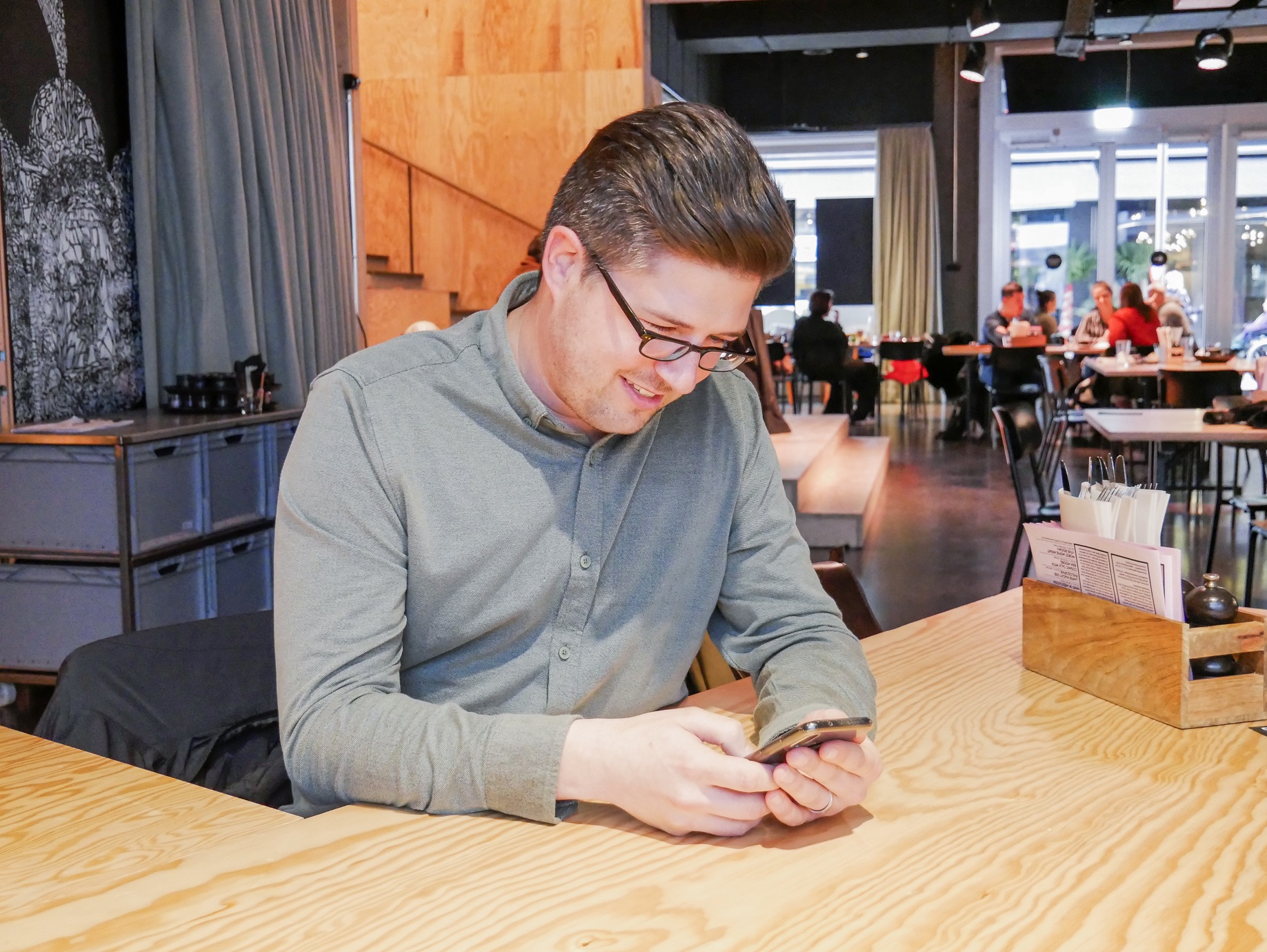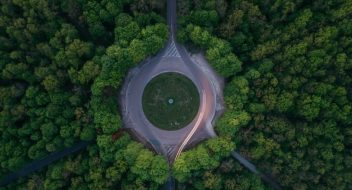How a young entrepreneur builds an innovative company by converting waste into new valuable products.…
Benjamin Leitschuh
Independent Environmental Engineer

His personal experience working on construction sites drew his attention to harmful materials and led to him acquiring a degree in environmental engineering. The poor labor market conditions in his home city Frankfurt encouraged him to apply abroad and move to Zurich. Customers’ desire to continue working with him even after he quit his job became the reason for his self-employment. This chain of life events brought Benjamin to where he is today.
However, he is not one to simply follow the herd: He actively builds his life, just as he helps build safe buildings. In this interview, Benjamin tells us why it is important to be pragmatic when it comes to self-employment, why the law is a key topic for the environment, what construction material dangers everyone should be aware of, and what is fascinating about engineering.

Did you always want to become an engineer? What motivated you to choose this profession?
Well, I’ve always been interested in technology. My father was a communications electrician. He installed alarm systems for museums, for example. In my childhood, instead of going to the movies in my spare time, my father and I would build something together. I think I built the first alarm system for my bicycle when I was 11 years old. So I always wanted to be in the technical field.
At first, I decided on mechanical engineering and started studying it after school. But after two semesters I realized that I didn’t like it that much and I wasn’t sure what to do next. You know, when you are 18 or 19 years old and you have to make a decision for your life, you can be confused. But just hanging around was not an option, so I started a craftsman’s education. And I think that was the turning point.
Why is that? How has this craftsman’s education influenced your professional path?
I mainly dealt with floor coverings there and very soon noticed symptoms such as skin irritation. In the beginning I didn’t know that this was work-related, but later I started to research for more detailed information about the materials we were using. It turned out that we were handling them incorrectly and were not protecting ourselves sufficiently. We did not even wear masks or gloves; nobody really knew anything about it. That’s when I became interested in the subject of health regulations in the construction sector. After my vocational training, I decided to go to the University of Applied Sciences, where I graduated with a degree in environmental engineering.
In my particular field, after graduation you were treated as if you knew nothing and could only hope for a low-wage or unpaid trainee program, which was really frustrating.
What exactly is environmental engineering?
My studies focused on such areas as ecological analysis, environmentally friendly construction, toxicology. Moreover, I can say that the most important thing in environmental protection in general is law. And I was very lucky to have a truly brilliant professor who really had a passion for it. He taught this seemingly boring subject in such an exciting and fascinating way that I felt inspired to learn more about it. This helped me a lot, because my whole profession is about law, and the knowledge I acquired during my studies still guides me every day.
This sounds like a very exciting, but also quite specific field. Was this profession in great demand after your graduation? Did you find a job easily?
Unfortunately not. When I finished my studies, the job market in Germany was not so good. You could apply for hundreds of jobs but still remain unemployed for years. In my particular field, after graduation you were treated as if you knew nothing and could only hope for a low-wage or unpaid trainee program, which was really frustrating. So it was clear to me that I most certainly had to move, wherever that would be, and I started to apply for all the German or English speaking jobs I could find. Luckily, I got a job in Zurich and moved here at very short notice in 2011.
What kind of job was it and what exactly is it that an environmental engineer does?
It was exactly the same job that I do now, namely planning, examining and consulting on harmful substances in the construction sector. There are legal regulations that prohibit the use of certain materials such as asbestos or some wood preservatives. In order to assess whether substances are harmful in a particular case the detection of them is not enough; it is the concentration that matters. For example, if the building has good air circulation or if you open windows several times a day, the potential risks are often lower. However, a very common problem these days can occur when people buy old houses, renovate them to modern standards and install new windows with good insulation. Everything looks and feels great, except for the fact that the house becomes sealed and what used to be harmless now reaches high concentrations and can become dangerous. These are the topics I consult on.

Which substances are these, for example, and what dangers can they cause?
One of the most well-known harmful construction substances is asbestos. Anyone who is exposed to a certain amount in the air over a long period of time can develop serious breathing problems or even cancer. Asbestos has not been allowed to be used in construction since 1990, but it is still present in older buildings, so it is very important to identify it before any construction work is carried out.
Another major problem is the radioactivity caused by radon – a gas that occurs naturally in the ground. It is usually found in the cellars of old houses, where wine is traditionally stored, for example. The original construction of such houses allowed natural air circulation, so radon had a low concentration and was not dangerous. However, once the house is sealed by modern walls and windows, radon can become highly concentrated, which seriously increases health risks.
Unlike the pharmaceutical industry, there are no strict rules in the construction sector for the introduction of new products onto the market. Such products can be sold and used for decades before some medical expert recognizes the connection between them and health problems.
These are truly frightening facts. If these substances are so dangerous, why is it not widely known and controlled?
There are several reasons. Firstly, not all types of reconstruction require a permit. For example, if you only change the kitchen or the flooring in the house, you do not need to apply for a permit for this renovation. Such changes are not officially controlled, so you are not aware of possible dangers. Secondly, not all potentially harmful substances are prohibited. Some of them are in a kind of grey area, as they can still be used as additives in low concentrations.
Furthermore, unlike the pharmaceutical industry, there are no strict rules in the construction sector for the introduction of new products onto the market. Such products can be sold and used for decades before some medical expert recognizes the connection between them and health problems. The symptoms caused by such substances are usually unspecific, which means that they can also be caused by other factors. Moreover, they may just as well not occur immediately, but only after many years. It therefore takes a very long time before official measures are taken to ban these substances.
How can one protect himself against these potential construction dangers? Is hiring an expert the only way?
When you buy a newly built house, you don’t need to worry about harmful substances like asbestos. But if you are buying or renovating a house older than 1990, I would definitely recommend you hire an expert, yes. I know this sounds like a high cost, but in reality a quick inspection can be enough and is not very expensive. As a private customer you often only need a visual inspection and a few substance tests, then you get a short report with recommendations for everything you need to consider. This is already very helpful and can be done with a small budget. If you are making minor changes, such as a new kitchen or flooring, I would recommend to at least talk to the contractor about harmful substances in the building. Usually they will be aware of the topic.
That is good to know, thanks for the tip! Would it be correct to say that after many years of studying and working with harmful substances you have reached a high level of expertise and therefore decided to become self-employed?
Well, yes and no. It’s true, I have been focused on harmful substances in construction from the very beginning. My career developed gradually: I started as a project manager, became a team head and then moved to another company as a division manager. But the decision to become self-employed had nothing to do with that. In fact, I was frustrated with the limited decision-making power in my function as a division manager. This is not due to a particular company, but to the system itself, which is similar in most engineering firms. As an employee, you always have to get along with and occasionally implement decisions that you yourself do not support. At some point you become held responsible for such decisions. That’s exactly the point I had reached, and so I quite spontaneously quit my last job.
Does that mean you weren’t planning on starting your own project? How did it happen then?
I hadn’t planned it at all, I just wanted to clear my head and take some time to think about my next step. But when you are in a niche, the job market is quite small and the possibilities are quite clear. At the same time, however, I know many colleagues or competitors through my involvement in the industry’s experts’ association. After my resignation I briefly mentioned there that my contacts are now switched to private ones. Just a few days later I received several telephone calls with job offers as well as offers for freelance work. Even former customers contacted me and expressly said: “We most certainly want to continue working with you on our project”. So I thought: Ok, I already have clients and partners who are interested in my services, why not give it a try?
I believe that anyone who wants to work independently should first ask themselves two questions: “Do I really want this?” and “Am I really ready for ups and downs?”
It’s great when you are convinced by the customers and not the other way around. After the decision was made, how hard was it to start your business?
This is something I really appreciate in Switzerland; the clarity and unambiguousness of official matters. At first, I couldn’t even believe it. When I went to the cantonal authorities and asked them how I should proceed, they were surprised and said, “Just start your project, and when you have clients and enough income, register with the compensation fund and declare your income to the tax authorities.” So it was very simple. Besides, I was lucky that my wife had started her company a few years ago, so I already had some knowledge, which is why everything only took about 5-6 days of work.
Still, the decision was rather spontaneous, wasn’t it? What were your concerns or thoughts in the beginning?
Certainly, I considered the risks. I believe that anyone who wants to work independently should first ask themselves two questions: “Do I really want this?” and “Am I really ready for ups and downs?” Because when you are on your own, you actually lose all those wonderful benefits of employment, such as paid holidays or sick pay. Yes, you have freedom in your decisions, but you may have to work even harder to get the same things you had as an employee.
You can make a super turnover in one month and hardly anything in the next, so it’s better to plan your budget annually, not monthly. “Can you handle it?” you have to ask yourself. I think it’s very important to get all that straight before you start your own business. But I’m fortunate that during my studies I was unwillingly trained to do so. At that time, I did an internship for the Ministry of Agriculture, which was professionally very valuable but was not paid. To make ends meet, I worked in bars and restaurants during the summer and lived on this money all year round. So I knew that I could handle an irregular income well.

What do you like most about your way of working and the engineering profession in general?
As for my work, I am often in different places and see many buildings that are not easy to get into. That’s really fascinating. My clients are not only private households, but also museums, universities, government buildings or industrial companies. I remember, for example, the City Theater of Bern, where I did the building examination and could walk through the entire building over several days using a general key. That was really quite special because you could literally look behind the curtain. It may sound sentimental, but when I’m on the road or driving to another city, I always see the buildings I worked in and it gives me a nice feeling, and sometimes a sense of home.
And in general I would define an engineer as someone who solves problems. Regardless of the specialty, the engineer is faced with the same process: defining the problem, analyzing it, finding a solution, implementing the solution. This search for a better, more efficient solution is what gives me real pleasure and satisfaction. That is why some of my leisure activities are connected to it.
What are these activities?
I like to repair things, so I volunteer for the project ‘Repair Café’. It is an organization that works against a throwaway society by helping people repair their favorite items. Most of the project’s volunteers are experts in specific fields – electronics, engineering, jewelry, watches. In Olten, where I live, it takes place three times a year and everyone can bring their broken items for repair free of charge. For me, working there is a very satisfying experience, because it is always a challenge, a task to be solved. Someone comes to you with a problem and you try to find out how you can solve it. That is really something I enjoy.

Sounds wonderful! We should definitely check out the upcoming event. Now that we’ve addressed the private sphere, let’s talk about your family. You mentioned that your wife recently started a business as well. How does the life of an entrepreneurial family look like? Isn’t it a risky venture when both partners are in the early stages of a business?
True, my wife started a fashion label a little earlier than I turned to self-employment. You are absolutely right, it is a risk and we have not yet reached the point where you could definitely say: ok, it definitely works. For me, starting up was relatively easy because I had customers from the very beginning. Nevertheless, there is no guarantee for the future. So I would say it needs another year to really see if it’s sufficient.
Regarding life itself, I think it has changed for the better for both of us. We work from home and can benefit from doing things together, helping each other. Independence also gives us a certain amount of flexibility, since when we are between projects or important business events, we can take a few days off and go somewhere. Then we simply take our laptops with us and can do any urgent tasks online while we spend the rest of the time on other activities.
I work hard when a project is ongoing and can take days off afterwards. With this kind of freedom, I have been given the chance to really enjoy my profession.
Does this mean that your life has become easier and more relaxed with self-employment?
Absolutely not! Actually, people often say to me: “Oh, now that you’re self-employed, you probably only take one assignment a week, so you have it easy!” In fact, I think I work more than I used to, I still have workload peaks when I work around the clock for several days or weeks. In addition, I have to do administration, planning and customer acquisition. However, it has become easier because I can manage my time by myself: I work hard when a project is ongoing and can take days off afterwards. With this kind of freedom, I have been given the chance to really enjoy my profession.
What can you recommend to other aspiring entrepreneurs or those who are considering self-employment?
I would recommend being pragmatic and honest with yourself. If you know that the risks of your business idea are high, think of the worst-case scenario and prepare yourself for it. Either save some money for bad times first or ask yourself if you would be ready to lower your life standard for a while to develop your business. If you can do that and really want to go the entrepreneurial way, then do it. Whatever the outcome, you will learn so much – not only about the business, but also about yourself and your skills. That is a guaranteed benefit.
Thank you very much for this interesting conversation and your valuable tips. We wish you every success with your project!

Learn more about Benjamin Leitschuh and his services here:










